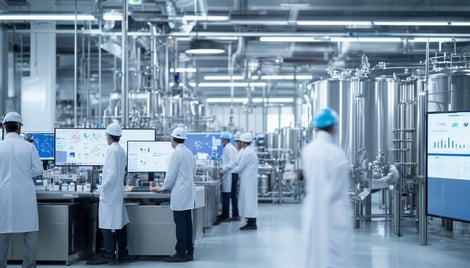
AI-Powered Solutions for Scheduling Under Uncertainty in Pharmaceutical Manufacturing
In the pharmaceutical manufacturing industry, scheduling is both an art and a science. The challenges of meeting regulatory requirements, addressing unpredictable demand, managing resource constraints, and handling unexpected disruptions make production scheduling an inherently complex task. Add to this the increasing complexity of supply chains and the need for agility in a rapidly evolving market, and it’s evident why traditional scheduling methods are insufficient.
This is where AI-powered solutions, integrated with advanced platforms like PlanetTogether and ERP systems such as SAP, Oracle, Microsoft Dynamics, Kinaxis, or Aveva, come into play. These tools are revolutionizing how Manufacturing IT Managers address uncertainty and optimize scheduling.

The Nature of Uncertainty in Pharmaceutical Manufacturing Scheduling
Pharmaceutical manufacturing deals with several forms of uncertainty:
Demand Variability: Fluctuations in demand for medications, often influenced by seasonal trends, health crises, or regulatory changes.
Supply Chain Disruptions: Delays in receiving raw materials or active pharmaceutical ingredients (APIs) can cascade into production delays.
Regulatory Compliance: Changes in compliance requirements can necessitate last-minute adjustments to production plans.
Resource Constraints: Machine downtime, labor shortages, or maintenance needs add further unpredictability.
To navigate these challenges, IT Managers need dynamic, intelligent tools that can adapt in real-time.

How AI-Powered Scheduling Works
AI-driven scheduling systems analyze historical data, real-time inputs, and predictive models to create robust and flexible production schedules. Here’s a breakdown of how they work:
Predictive Analytics
Using data from past production cycles, AI algorithms forecast potential disruptions, machine performance trends, and demand fluctuations. For example, if a specific batch of equipment consistently requires maintenance after 1,000 hours, the system will preemptively adjust the schedule to minimize downtime.
Scenario Simulation
AI-powered tools like PlanetTogether, integrated with platforms such as SAP or Oracle, can simulate various "what-if" scenarios. This capability is invaluable when responding to uncertainties such as raw material shortages or sudden surges in demand for specific medications.
Real-Time Optimization
Real-time data integration with ERP systems enables immediate adjustments to schedules. For instance, if a shipment of APIs is delayed, the AI system can reallocate resources to prioritize other production lines, ensuring minimal disruption.
Machine Learning (ML)
As the system processes more data over time, ML algorithms improve the accuracy of predictions and efficiency of schedules. This adaptive learning is particularly critical in pharmaceutical settings, where variability is high.

PlanetTogether and ERP Integration
To fully leverage AI-powered scheduling, integration between scheduling tools and enterprise systems is essential. PlanetTogether, when connected with ERP systems like SAP, Oracle, Microsoft Dynamics, Kinaxis, or Aveva, provides a seamless flow of data and operational intelligence. Here’s how this integration enhances scheduling under uncertainty:
Streamlined Data Sharing
Data silos are a major barrier to effective scheduling. Integration ensures that data from procurement, production, inventory, and quality control flows seamlessly into the scheduling system. For example, SAP’s real-time inventory data helps PlanetTogether prioritize production tasks based on available resources.
Enhanced Decision-Making
ERP systems provide macro-level insights, while PlanetTogether focuses on micro-level scheduling. Together, they empower IT Managers to make informed decisions that balance short-term agility with long-term strategic goals.
Regulatory Compliance
The pharmaceutical industry is governed by strict regulations. Integrating PlanetTogether with ERP platforms helps ensure compliance by incorporating quality control checks and validation processes directly into the production schedule.
Scalability and Flexibility
Integration facilitates scaling operations and adapting to new challenges without overhauling existing systems. For instance, integrating Kinaxis with PlanetTogether enables advanced supply chain visibility, critical for aligning production schedules with global supply chain dynamics.
Benefits of AI-Powered Scheduling
For Manufacturing IT Managers, the advantages of AI-powered scheduling solutions are transformative:
Increased Efficiency: Automation reduces manual scheduling efforts, allowing teams to focus on strategic tasks.
Enhanced Resilience: AI systems quickly adapt to changes, minimizing the impact of disruptions.
Cost Savings: Optimized scheduling reduces waste, energy consumption, and idle time.
Improved Quality: By incorporating real-time quality control data, these systems ensure higher product consistency.
Regulatory Alignment: Integration with ERP systems helps maintain compliance effortlessly.
In a world where uncertainty is the only constant, AI-powered scheduling solutions are the key to resilience and efficiency in pharmaceutical manufacturing. By integrating tools like PlanetTogether with ERP systems such as SAP, Oracle, Microsoft Dynamics, Kinaxis, or Aveva, Manufacturing IT Managers can navigate the complexities of production scheduling with confidence.
These advanced systems not only mitigate risks and disruptions but also unlock new levels of operational excellence, enabling pharmaceutical manufacturers to deliver life-saving medications reliably and efficiently. For IT Managers, the message is clear: the future of scheduling lies in harnessing the power of AI. Embrace it, and transform uncertainty into opportunity.
Are you ready to take your manufacturing operations to the next level? Contact us today to learn more about how PlanetTogether can help you achieve your goals and drive success in your industry.



